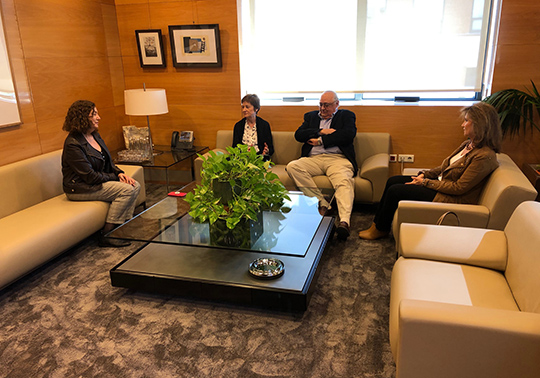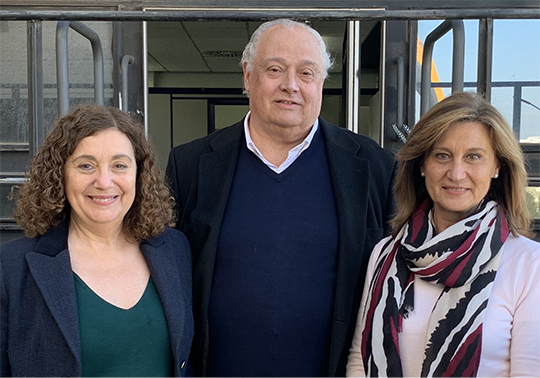
The World Health Organization (WHO) and the Food and Agriculture Organization of the United Nations (FAO) have redesigned the UV Health Parasitology Unit for the third time, setting a world reference centre for fascioliasis in humans.
The principal of the Universitat de València, María Vicenta Mestre, met the director of the Parasitology Unit of the Pharmacy, Pharmaceutical Technology and Parasitology Department of the Universitat de València, Santiago Mas-Coma, as the Unit had been re-elected as an Official Collaborating Centre by WHO and FAO. Two deputy directors of the Parasitology Unit, the vice-principal for Employment and Training Services Adela Valero and a full university professor Dolores Bargues, also attended the meeting.
The Unit has been re-elected after eight months of assessments conducted by WHO. Moreover, Parasitology Unit works directly with the WHO headquarters in Geneva (Switzerland), not with the WHO Regional Office for Europe as other WHO collaborating centres.
The principal María Vicenta Mestre stated that “the university is proud to have such valuable research groups as the Parasitology Unit. For this reason we want to recognise the efforts of the professor Santiago Mas-Coma and thank him for his work in charge of the group, which has become a reference centre on an international level.”
“We are a reference centre of these two UN agencies: of WHO since 2001 and of FAO since 2003. The nominations renew every four years after conducting a tough monthly stark assessment,” added the director of the Unit, Santiago Mas-Coma.
Spain currently has 15 WHO collaboration centres, with the majority of them working within ministries and only three in the Spanish universities. For this reason, re-election of the Parasitology Unit of the UV bears special importance.
New challenges resulting from infectious diseases are more than evident in the world nowadays. The effects of climate change and the impact of the so-called global change lead to modifications in prevalence, intensity, and geographical spread of diseases. Epidemics are now expanding at a very high speed as a result of bigger and faster means of transportation for humans, as well as animals and plants. In just a short time, a local epidemic has a risk of transforming into a global one.
New environmental factors make the UN agencies, which are responsible for the control of these diseases at the international level, strengthen the bonds of effective and permanent collaboration with productive and prestigious research groups. The structures of WHO and FAO include specific reference centres for diseases in humans and in animals respectively. These centres are chosen for the period of four years, and their activities and help are reviewed annually by the panels of internal and external experts whose demand is extremely high. Only when a four-year work period is positively assessed and a centre is chosen to continue helping and contributing to the well-being of society, the organisations start redesigning it for a new subsequent period.
Health Parasitology Unit of the Faculty of Pharmacy holds the WHO and the FAO nominations since 2011 and 2013 respectively and is redesigned again to continue fulfilling its functions. In Spain, there are 12 official WHO Collaborative Centres, 6 of which are based at the universities, while there are even fewer centres of FAO. The management team of the Unit includes a full university professor of Parasitology, Santiago Mas-Coma, who is in charge of the Unit, and the professors Dolores Bargues and Adela Valero as its vice-directors.
Mas-Coma explained that “our ability to work both in fields and in lab units, as well as to take a multidisciplinary approach to the study of diseases, helped to coordinate a wide network of centres in countries on every continents. It took use many years of collaboration and expert training to build this network; but now, thanks to this network, we can respond fast no matter where a health problem or an epidemic occurs.”
In her speech, Dolores Bargues has related to her responsibilities: “I mainly manage research describing infectious agents and the issues of molecular Biology. After so many years, we have developed an extensive database that allows us identify specific cases very fast.”
Meanwhile, Adela Valero explained “the lines of research that I coordinate pose the difficulty of result transfers from our team to healthcare centres based on the cutting-edge research methodologies. Therefore, we are forced to design additional tools for the healthcare professionals to apply in endemic zones in the developing countries.”
“We are now waiting for requests from many Latin American countries, mainly of the Andean states, Africa, the Mediterranean countries and Sahel, as well as Asia - from the Near East to Southeast Asia, including India, Bangladesh, Pakistan, and Sri Lanka. Mongolia also forms a part of this list as we have received its request this week,” explained the director Mas-Coma.
Images:












